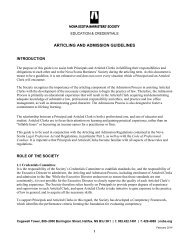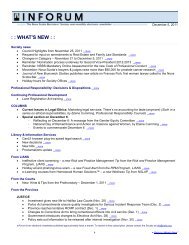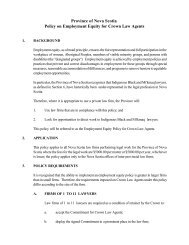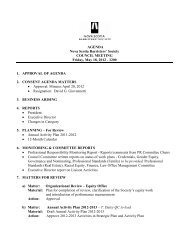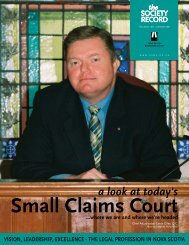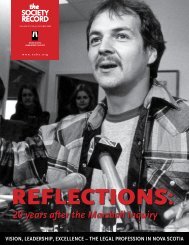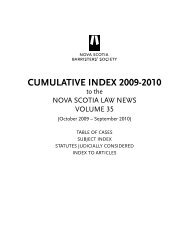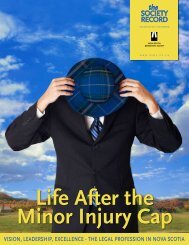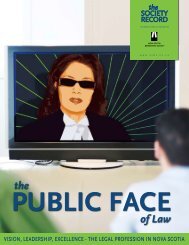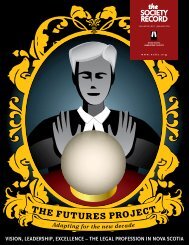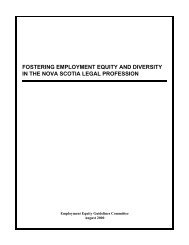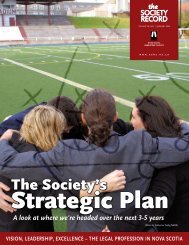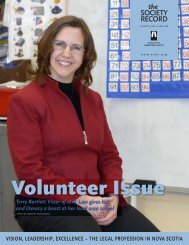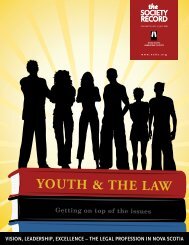the SOCIETY RECORD - Nova Scotia Barristers' Society
the SOCIETY RECORD - Nova Scotia Barristers' Society
the SOCIETY RECORD - Nova Scotia Barristers' Society
Create successful ePaper yourself
Turn your PDF publications into a flip-book with our unique Google optimized e-Paper software.
Small rural and close communities – whe<strong>the</strong>r based on geographical<br />
boundaries or o<strong>the</strong>r societal boundaries such as race, language<br />
or ethnicity – may face similar cultural norms. People in <strong>the</strong>se<br />
communities are more likely to know of and speculate on <strong>the</strong> affairs<br />
of those living and operating in <strong>the</strong> community. In o<strong>the</strong>r words,<br />
people are more likely to know each o<strong>the</strong>r’s business. Community<br />
members expect and perhaps even demand involvement of lawyers<br />
in local organizations or events. There is a greater expectation<br />
that lawyers in a small community will take on leadership roles in<br />
organizations or lead on local issues.<br />
‘Community’ has many definitions<br />
Because of <strong>the</strong> close-knit nature of small communities, this means<br />
that lawyers living in those communities are more likely to know<br />
different citizens involved in a legal issue.<br />
All of <strong>the</strong>se factors can lead to a blurring of <strong>the</strong> ethical lines<br />
between client, lawyer and community. The lawyer in a small<br />
community practice needs to be vigilant in understanding <strong>the</strong>se<br />
various cultural norms and pressures evident in a small community<br />
practice. Understanding <strong>the</strong> legal needs and issues faced by people<br />
living in a small community practice includes understanding <strong>the</strong><br />
cultural norms of <strong>the</strong> community. Additionally, working in a<br />
small community practice means juggling various demands and<br />
expectations from your clients, while adhering to <strong>the</strong> <strong>Society</strong>’s<br />
Code of Professional Conduct and various practice standards.<br />
Those starting a practice in a small community can best address<br />
<strong>the</strong>se extra pressures by being aware of <strong>the</strong> cultural norms and<br />
pressures evident in <strong>the</strong> community, being clear about <strong>the</strong>ir<br />
role as a lawyer and <strong>the</strong>ir role as a member of <strong>the</strong> community;<br />
to understand that every engagement with community members<br />
is a learning opportunity, not only to learn about <strong>the</strong> norms of<br />
<strong>the</strong> community, but also potential issues and <strong>the</strong>ir own personal<br />
expectations, strengths and weakness.<br />
Resources<br />
The <strong>Society</strong> can help with some of <strong>the</strong>se issues, through practice<br />
advice, support and o<strong>the</strong>r resources.<br />
• Mentorship: One of <strong>the</strong> best ways of learning how to sort<br />
through <strong>the</strong>se issues is by having a mentor. For information<br />
about <strong>the</strong> LIANS and NSBS Mentorship Program, see<br />
www.lians.ca/rpm/mentorship_program/, in <strong>the</strong> Risk and<br />
Practice Management section of <strong>the</strong> LIANS website.<br />
• Ethics advice: Lawyers are encouraged to contact <strong>the</strong> <strong>Society</strong><br />
whenever <strong>the</strong>y encounter an ethical issue <strong>the</strong>y are unsure<br />
about. The <strong>Society</strong>’s Professional Responsibility Counsel<br />
is always available to discuss <strong>the</strong> situations that lawyers are<br />
facing, and to provide lawyers with assistance in working <strong>the</strong>ir<br />
way through <strong>the</strong> Code of Professional Conduct and interpreting<br />
<strong>the</strong> rules of ethics that may apply. In some circumstances,<br />
<strong>the</strong> PR Counsel will seek <strong>the</strong> views of <strong>the</strong> Ethics Advisory<br />
Committee, which is comprised of five senior members of <strong>the</strong><br />
Bar with diverse legal practices and significant experience in<br />
<strong>the</strong> area of legal ethics.<br />
• Equity Office: Contact Emma Halpern, <strong>the</strong> <strong>Society</strong>’s Equity<br />
Officer, for advice or support, at equity@nsbs.org or 902 422<br />
1491.<br />
The ethical challenges are varied, depending on <strong>the</strong> type of<br />
community in which a lawyer practises. Shawna Hoyte QC, of<br />
<strong>the</strong> Dalhousie Legal Aid Service on Gottingen Street in Halifax,<br />
and <strong>Society</strong> President Timothy Daley QC, a sole practitioner<br />
in New Glasgow, shared a few thoughts on <strong>the</strong> subject with<br />
Emma Halpern, <strong>the</strong> <strong>Society</strong>’s Equity Officer.<br />
Q: What did you think about this article?<br />
SH: The article did a great job at highlighting <strong>the</strong> similarities,<br />
challenges and benefits between practice in rural communities<br />
and that of small communities and close communities. Many<br />
of <strong>the</strong> comments were on point in terms of my work as a<br />
lawyer from a small and close community. With respect to <strong>the</strong><br />
comments about practice in rural communities, I believe rural<br />
practice presents many opportunities for African <strong>Nova</strong> <strong>Scotia</strong>n<br />
lawyers and, given that we are familiar with <strong>the</strong> challenges of<br />
working with people we know or are directly connected to, we<br />
would be capable of adjusting to such challenges with ease.<br />
TD: I found <strong>the</strong> article to be a very helpful summary of many<br />
of <strong>the</strong> challenges faced by rural practitioners. It provides <strong>the</strong><br />
statistics to confirm what we all know intuitively to be true,<br />
based on our own experiences. Rural practice is rewarding but<br />
increasingly challenging and we need to work toge<strong>the</strong>r to find<br />
solutions to <strong>the</strong>se challenges in <strong>the</strong> public interest.<br />
Q: Did any of <strong>the</strong> identified challenges resonate with you?<br />
SH: The article speaks to <strong>the</strong> challenges I face on a daily<br />
basis as a lawyer from <strong>the</strong> African <strong>Nova</strong> <strong>Scotia</strong>n community:<br />
dealing with <strong>the</strong> expectations, assumptions, challenges, and<br />
commitments to family, clients and community, while adhering<br />
to <strong>the</strong> <strong>the</strong> Code of Professional Conduct. It becomes a balancing<br />
act between one’s personal life and professional life as a lawyer.<br />
Coming from a close community, I am always in my role as a<br />
lawyer whe<strong>the</strong>r I want to be or not. I am always cognizant of<br />
what I say and who I say it to. When <strong>the</strong>re are so few of us,<br />
<strong>the</strong> demand from <strong>the</strong> community is at times overwhelming.<br />
I believe I have a responsibility to my community to do what<br />
I can to promote and provide access to justice, which is a<br />
relatively new concept to <strong>the</strong> African <strong>Nova</strong> <strong>Scotia</strong>n community.<br />
TD: Many of <strong>the</strong> challenges indentified resonated with me. For<br />
example, I see my local Bar is aging quickly. Even after practising<br />
21 years, I am still not close to being among <strong>the</strong> most senior<br />
members in my county. I see lawyers in my community working<br />
(continued on next page)<br />
Spring 2013 25



